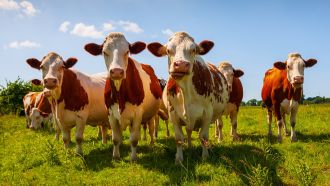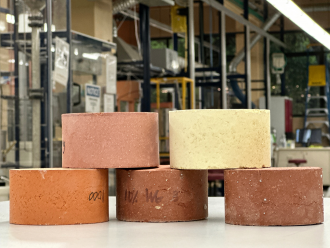-
NEWS BRIEFING: How do we ensure a thriving Murray-Darling Basin in 50 years?
BRIEFING RECORDING NOW AVAILABLE We must protect the future of the Murray-Darling Basin, according to Aussie experts who say climate change is threatening the river’s health and sustainability. Ten of Australia’s leading water experts have Read more about NEWS BRIEFING: How do we ensure a thriving Murray-Darling Basin in 50 years?
Australia; NSW; SA; ACTAustralian Academy of Technological Sciences and Engineering (ATSE) -
It’s not too late to save the West Antarctic Ice Sheet
Nature Communications
New NZ-led research has found a ‘missing piece in the puzzle’ of West Antarctic Ice Sheet melt, revealing the collapse of the ice sheet in the Ross Sea region can be prevented – if we keep to a low-emissions pathway. This is crucial, as Read more about It’s not too late to save the West Antarctic Ice Sheet
New Zealand; InternationalGNS Science|Victoria University of Wellington|Los Alamos National Laboratory, USA; -
Urgent need for logging loophole remedy within proposed koala national park
International Journal of Social Quality
A team of conservation and policy researchers have called for a logging loophole within the proposed Great Koala National Park to be urgently remedied to stem the tide of harmful outcomes impacting the South East Australian koala population. The new Read more about Urgent need for logging loophole remedy within proposed koala national park
Australia; NSW; QLD; SAGriffith University|Flinders University|Central Queensland University -
How do we improve heart disease diagnosis in women?
Frontiers in Physiology
The current method of measuring heart disease risk leaves many women undiagnosed, according to international researchers who used AI to find better ways to detect heart disease in women. Using AI models, the team found that women are underdiagnosed Read more about How do we improve heart disease diagnosis in women?
InternationalStanford University, USA -
Call for enhanced research into common post-stroke condition
Topics in Stroke Rehabilitation
Lateropulsion, a clinical condition that results in the body leaning to one side affects about half of all stroke survivors. In recent research, the team found that lateropulsion could continue to resolve up to one-year post-stroke, far beyond the Read more about Call for enhanced research into common post-stroke condition
Australia; WAEdith Cowan University -
No bull: How breeding less-gassy cows could help fight climate change
Climate
A Curtin University study has revealed breeding less-flatulent cows and restoring agricultural land could significantly reduce rising methane emission levels, which play a considerable role in climate change. A Curtin University study has revealed Read more about No bull: How breeding less-gassy cows could help fight climate change
Australia; WACurtin University -
Tropical fish are invading Australian ocean water
Journal of Animal Ecology
A University of Adelaide study of shallow-water fish communities on rocky reefs in south-eastern Australia has found climate change is helping tropical fish species invade temperate Australian waters. According to the team, the fish are travelling Read more about Tropical fish are invading Australian ocean water
Australia; NSW; SAThe University of Adelaide|University of Technology Sydney (UTS) -
Energy-smart bricks keep waste out of landfill
Construction and Building Materials
Engineers have invented energy-efficient bricks with scrap materials, including glass, that are normally destined for landfill. Test results indicate that using these bricks in the construction of a single-storey building could reduce household Read more about Energy-smart bricks keep waste out of landfill
Australia; VICRMIT University -
Hey Dave, I’ve got an idea for you. What’s the potential of AI-led workshopping?
JOSPT Open
Sure, ChatGPT can write a poem about your pet in the style of T. S Eliot, but generative artificial intelligence (AI) chatbots have a potentially more useful role to play in idea generation according to a new study by University of Technology Sydney Read more about Hey Dave, I’ve got an idea for you. What’s the potential of AI-led workshopping?
Australia; NSWUniversity of Technology Sydney (UTS) -
Arthritis linked to blood cancer mutations
Blood
A team of Adelaide and US researchers has discovered a link between a less common form of rheumatoid arthritis and gene mutations found in blood cancer. The team was surprised to discover that many patients with mutations in epigenetic genes that Read more about Arthritis linked to blood cancer mutations
Australia; SASouth Australian Health and Medical Research Institute (SAHMRI)... -
COVID-19 treatment guidelines differ widely between countries, and most recommend treatments that don't work
BMJ Global Health
National clinical guidelines for the treatment of COVID-19 vary widely around the world, with poorer countries furthest from the 'gold standard' treatment recommendations by the World Health Organization (WHO), and most countries recommending at Read more about COVID-19 treatment guidelines differ widely between countries, and most recommend treatments that don't work
InternationalUniversity of Oxford, UK, Mahidol University, Thailand -
Is your doctor female? You may be less likely to die
Annals of Internal Medicine
A Japanese and US study of more than 700,000 US patients over the age of 65 found that those with a female doctor were less likely to die or be readmitted to hospital, compared to patients with a male doctor, and the effect was more pronounced for Read more about Is your doctor female? You may be less likely to die
InternationalThe University of Tokyo, Japan -
EXPERT REACTION: Australia is having more frequent fires and it is bad news for threatened species
Proceedings of the National Academy of Sciences (PNAS)
The habitats of Australia's threatened species are experiencing widespread declines in unburnt areas and increases in fire frequency, new research suggests. The study looked at fire patterns across southern Australia from 1980 to 2021, spanning 415 Read more about EXPERT REACTION: Australia is having more frequent fires and it is bad news for threatened species
Australia; NSW; VIC; QLD; SA; WA; NT; ACTThe University of Sydney|Deakin University|Charles Sturt University... -
Digital alcohol marketing reinforces harmful gender norms
Drug and Alcohol Review
A NZ-led research team found online alcohol marketing is not only highly gendered, but digital ads targeted towards women drew on a much wider range of both traditional and evolving gender norms than for men. For example, traditional stereotypes Read more about Digital alcohol marketing reinforces harmful gender norms
New Zealand; InternationalUniversity of Auckland|Caledonian University, Glasgow, United Kingdom -
How can health authorities better communicate with multicultural Australia in an emergency?
Australian Journal of Social Issues
In a public health crisis like a pandemic or natural disaster, health authorities could benefit from working more with trusted local community organisations and leaders to ensure the message is not only delivered but also received and understood, Read more about How can health authorities better communicate with multicultural Australia in an emergency?
Australia; VICLa Trobe University -
Arvo at work dragging? Try looking at a cluttered, forgettable image to speed up time
Nature Human Behaviour
What's in an image we're looking at appears to influence our perception of the passing of time, according to US researchers, who say their findings suggest there's no 'universal internal clock' in the brain. The team asked 170 people to observe a Read more about Arvo at work dragging? Try looking at a cluttered, forgettable image to speed up time
InternationalGeorge Mason University, USA -
Sustainable tool can diagnose several different cancers
Nature Sustainability
Chinese scientists say they've developed an accurate, affordable, and environmentally and user-friendly diagnostic tool for multiple cancers – including pancreatic, gastric, and colorectal cancers. They say it can diagnose cancers within minutes Read more about Sustainable tool can diagnose several different cancers
InternationalEast China Normal University, China -
New JWST observations reveal black holes rapidly shut off star formation in massive galaxies
Nature
New research published in Nature showcases new observations from the James Webb Space Telescope (JWST) that suggest black holes rapidly shut off star-formation in massive galaxies by explosively removing large amounts of gas. New research published Read more about New JWST observations reveal black holes rapidly shut off star formation in massive galaxies
InternationalSwinburne University of Technology -
Delirium ID toolkit boosts carer knowledge to prevent, manage the condition
Journal of General Internal Medicine
Carers involved in a pilot study have endorsed an online tool for assessing delirium which gives them a key role in the management of loved ones affected by the confused mental state. The new Australian-led international research showed delirium Read more about Delirium ID toolkit boosts carer knowledge to prevent, manage the condition
Australia; International; NSW; QLD; ACTSouthern Cross University|University of the Sunshine Coast... -
Daily aspirin could help reduce colorectal cancer development
Cancer
Long-term daily use of aspirin could help slow and prevent the progression of colorectal cancer, according to international researchers. The team looked at tissue samples of 238 patients who underwent surgery for colorectal cancer, 12% of whom were Read more about Daily aspirin could help reduce colorectal cancer development
InternationalVeneto Institute of Oncology IOV‐IRCCS, Italy




















































